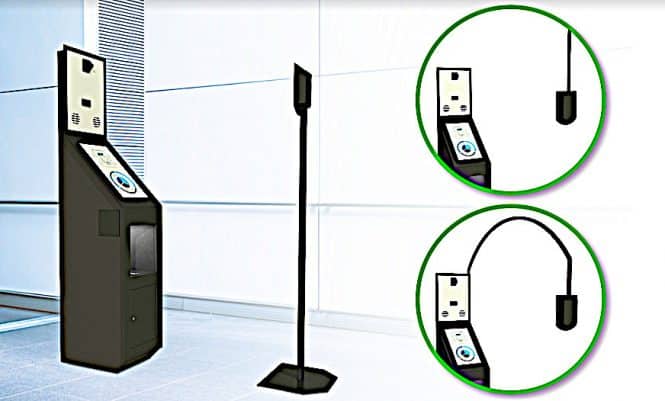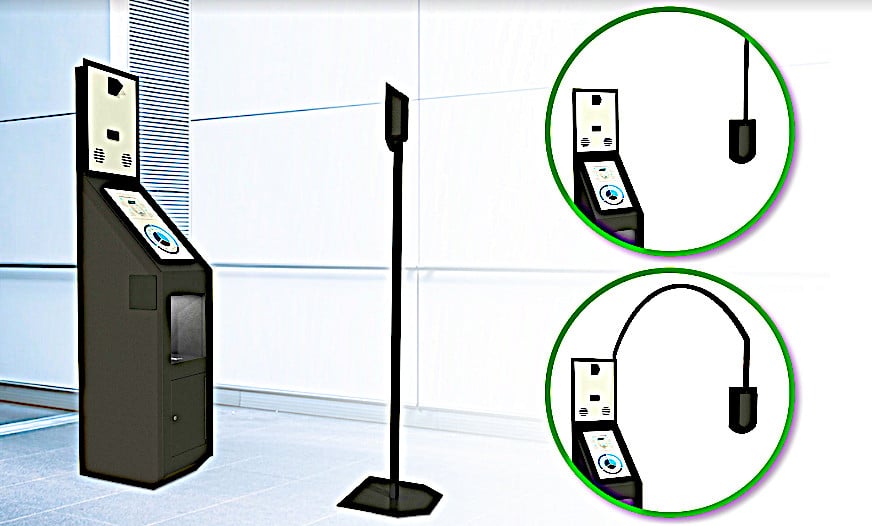
From the Frank Mayer blog Jul2020 —
As states begin easing COVID-19-related business restrictions, many companies have been careful to enact strategies that allow a safe return to operations.
Unsurprisingly, many are looking to fever detection systems as a first step to help flag associates who are running a temperature and are at risk of bringing an illness into the workplace.
These detection devices can range from handheld scanners to self-service kiosks, but the most beneficial system to employers is a remote temperature screening kiosk that allows an agent to monitor employee temperatures from an offsite location. Read more about the advantages of remote temperature detection.
Employee Health Privacy
Many regulations exist regarding workplace temperature screening, which is classified as a type of medical examination. As a result of the pandemic, however, the U.S. Equal Employment Opportunity Commission (EEOC) has relaxed some guidelines to allow employers to measure an employee’s temperature to prevent a potential workplace outbreak.
With these reduced restrictions, though, comes an increased focus on employee privacy. How can employers capture information while still abiding by confidentiality requirements? Further, how can employees who scan positive for a fever maintain discretion to avoid social stigma?
Current solutions like kiosk stations risk a line full of employees seeing a fever indicator alert pop onscreen during a colleague’s testing. Handheld scanners aren’t much better when the examiner must relay the information to the person being tested.
Fortunately, remote temperature screening kiosks provide the solution to protect employee privacy since they are manned by an individual offsite who reads the results. Software providers can work with different employers to establish a process to alert the employee without risking a breach of confidentiality. Options include text messages or push notifications to a phone, alerts to an employee’s email, and more.
Convenience for Large Corporations
Remote temperature screening is especially beneficial to companies with multiple locations. Assessing temperatures at each site with handheld scanners or scanning stations is a costly process, involving expensive labor with a minimum hourly requirement. These routes also open the door to different standards or processes performed at each, leading to potential inaccuracies.
Having a centralized hub to oversee operations can ensure convenience and consistency as well as quickly flag any locations that might pose a possible threat for an outbreak based on the number of positive test results.
Employee and Staff Safety
Current social distance recommendations encourage people to stay six feet apart. Handheld scanners do not allow employees and temperature-takers to abide by this rule, thus increasing the risk of spreading illness.
In addition, self-service kiosks have been a growing option for temperature screening, however, employers put the responsibility on employees to observe the rules if a fever is detected. They also give the impression that employers are taking a “hands-off” approach to monitoring important vitals.
With remote temperature screening kiosks, employees can quickly step between the kiosk and the thermal imaging camera without having to interact with a person or touch a screen. Within seconds, the reader can take the person’s temperature, and he or she is done. And while these kiosks grant the ease of self-service, they’re still supervised by staff who can identify fevers and alert the employees.
A Less Expensive Option
Dedicating staff or contracting a service to monitor temperatures with handheld thermal guns or thermal imaging stations can be a costly endeavor, oftentimes requiring a level of medical training for current employees or a minimum number of commissioned hours through a service.
Remote temperature screening kiosks eliminate the need for extra staffing costs, allowing HR personnel or other dedicated agents to screen multiple locations from one place.
Long Term Benefits
Currently, Frank Mayer and Associates, Inc. partners with employee engagement software provider Agile Force to offer remote temperature screening kiosks that go beyond just temperature monitoring. The remote engagement software allows Human Resources departments and staffing agencies to monitor shift changes, greet new hires, connect employees to departments like HR, payroll, or telemedicine, interview job candidates, and much more.
Not only does this help companies get more immediate use out of a kiosk investment, but it also extends the utility of the kiosks long after the need for temperature reading has passed.
Conclusion
The COVID-19 pandemic has required companies to map out unique strategies to bring back staff while preserving safety in the workplace. With numerous fever detection options in the field, companies will realize the greatest benefits when employing remote temperature screening kiosks.
—
As a leading voice in the interactive kiosk industry, Frank Mayer and Associates, Inc. has developed a remote temperature screening kiosk that utilizes software and thermal imaging cameras to scan body temperatures. But its capabilities extend well beyond that.
More Posts


